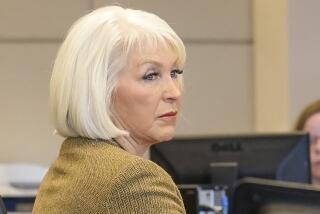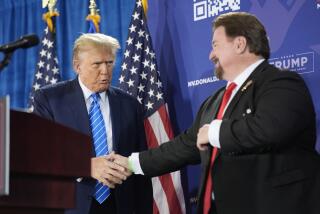Vegas ACORN worker details ‘blackjack’ plan
LAS VEGAS — In the summer of 2008, with presidential contenders battling fiercely over the swing state of Nevada, Christopher Edwards was racing to register voters.
As the field director of ACORN’s Las Vegas office, he brainstormed a way to motivate meagerly paid canvassers: If they turned in 21 or more registration cards in a day, they were each given a $5 bonus.
“Hey, it’s Las Vegas,” Edwards testified Tuesday. “It’s blackjack.”
But Edwards’ “blackjack bonuses,” which he bragged about to other ACORN offices, broke the law, state prosecutors say. Nevada bars quotas or cash incentives in voter sign-up efforts: Officials fear they could lead to false registrations.
On Tuesday, a judge began considering whether Edwards’ former supervisor, Amy Busefink, and the Assn. of Community Organizations for Reform Now will stand trial on 13 low-level felony charges of compensation for registration of voters. The evidentiary hearing will resume this morning.
Edwards, a former union organizer who once worked for former Democratic presidential candidate Howard Dean, has pleaded guilty to two misdemeanor counts. He took the stand Tuesday as the prosecution’s star witness.
“No one in ACORN knew this was illegal,” he told Justice of the Peace William D. Jansen.
In recent weeks, ACORN, a longtime target of Republican ire, has been battered by secretly recorded videos from other states that appear to show ACORN staffers advising two conservative activists -- who were posing as a pimp and a prostitute -- on tax evasion, human smuggling and child prostitution.
The IRS, Census Bureau and Bank of America have severed ties with ACORN, and Congress has voted to slash its federal funding. The controversies have heightened the attention paid to the Nevada case.
Clare Crawford, ACORN’s deputy political director, called the charges here “political grandstanding,” though Nevada’s secretary of state and attorney general are Democrats. Their investigation began in 2008, after Clark County officials complained that some registration forms issued to ACORN had come back fraudulent -- in one instance, someone had signed up much of the Dallas Cowboys’ starting lineup.
Edwards, who said he was under pressure to boost the number of voter registration forms collected, oversaw as many as eight political organizers and their teams of canvassers. If canvassers, who made $8 an hour, turned in fewer than 20 registration cards a day, their jobs were at risk.
“I seen a lot of people getting laid off,” testified Dwain Dennie, an ACORN canvasser who worked outside a welfare office.
Edwards thought up the blackjack program as a response to canvassers who had falsified time cards or generally slacked off, he testified. It was an informal plan, announced on a huge office dry-erase board, but not in e-mails or memos -- a fact that drew some derision from Jansen.
ACORN attorney Lisa Rasmussen suggested that bonuses marked on time sheets might have been for mileage, working in extreme heat or speaking multiple languages -- not blackjack incentives.
Edwards, however, said that Busefink not only signed off on the program, she suggested that canvassers turn in more cards to get the bonus. She also praised the program, Edwards testified, saying it capitalized on the “Las Vegas mystique.”
Defense attorneys, however, portrayed Edwards as a rogue director with a “maverick attitude” who rarely informed superiors of his plans. Busefink attorney Kevin Stolworthy suggested that Edwards was bitter over workplace squabbles.
--
More to Read
Sign up for Essential California
The most important California stories and recommendations in your inbox every morning.
You may occasionally receive promotional content from the Los Angeles Times.










